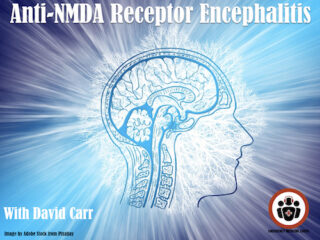Neurology
Episode 85 – Medical Clearance of the Psychiatric Patient
Psychiatric chief complaints comprise about 6 or 7% of all ED visits, with the numbers of psychiatric patients we see increasing every year. The ED serves as both the lifeline and the gateway to psychiatric care for millions of patients suffering from acute behavioural or psychiatric emergencies. As ED docs, besides assessing the risk of suicide and homicide, one of the most important jobs we have is to determine whether the patient’s psychiatric or behavioral emergency is the result of an organic disease process, as opposed to a psychological one. There is no standard process for this. With the main objective in mind of picking up and appropriately managing organic disease while improving flow, decreasing cost and maintaining good relationships with our psychiatry colleagues, we have Dr. Howard Ovens, Dr. Brian Steinhart and Dr. Ian Dawe discuss this controversial topic...
Episode 73 Emergency Management of Pediatric Seizures
Pediatric seizures are common. So common that about 5% of all children will have a seizure by the time they’re 16 years old. If any of you have been parents of a child who suddenly starts seizing, you’ll know intimately how terrifying it can be. While most of the kids who present to the ED with a seizure will end up being diagnosed with a benign simple febrile seizure, some kids will suffer from complex febrile seizures, requiring some more thought, work-up and management, while others will have afebrile seizures which are a whole other kettle of fish. We need to know how to differentiate these entities, how to work-them up and how to manage them in the ED. At the other end of the spectrum of disease there is status epilepticus – a true emergency with a scary mortality rate - where you need to act fast and know your algorithms like the back of your hand. This topic was chosen based on a nation-wide needs assessment study conducted by TREKK (Translating Emergency Knowledge for Kids), a collaborator with EM Cases. With the help of two of Canada’s Pediatric Emergency Medicine seizure experts hand picked by TREKK, Dr. Lawrence Richer and Dr. Angelo Mikrogianakis, we’ll give you the all the tools you need to approach the child who presents to the ED with seizure with the utmost confidence.
Best Case Ever 29: Drug Induced Aseptic Meningitis
Dr. David Carr presents his third of EM Cases' Carr's Cases. This series features potentially debilitating diagnoses that may be thought of as 'zebras', but actually have a higher incidence then we might think - and if diagnosed early, can significantly effect patient outcomes. Dr. Carr tells the story of young woman with an MRSA supra pateller abscess who was put on trimethoprim sulfamethoxazole and presents looking very ill with a severe headache. Not only has trimethoprim sulfamethoxazole been implicated in aseptic meningitis, but NSAIDS, immunomodulators and antibiotics have also been implicated. The reason this is so important for ED practitioners to know, is that case reports of drug-induced aseptic meningitis have shown that symptoms will resolve completely within 24 hours, once the offending drug has been stopped. Not only that, but if the patient receives the drug again in the future, they are at risk for a more severe case of drug induced aseptic meningitis.
Best Case Ever 28: Anti-NMDA Receptor Encephalitis
Dr. David Carr presents his second of Carr's Cases. This series features some potentially life-threatening diagnoses that may be perceived as zebras, but actually have a higher incidence then we might think - and if diagnosed early, can significantly effect patient outcomes. This Best Case Ever is about Anti-NMDA Receptor Encephalitis, a diagnosis that was only discovered in 2005, and has only recently been recognized by the Emergency Medicine community. Anti-NMDA Receptor Encephalitis may mimic a first presentation of schizophrenia or Neuraleptic Malignant Syndrome. It may present with seizure, altered mental status, autonomic instability or movement disorder in the absence of drug exposure. When you are faced with any of these presentations and no other diagnosis seems to fit, do an LP and send the CSF for anti-NMDA receptor antibodies. The time-sensitive treatment is IVIG and steroids. Anti-NMDA receptor Encephalitis is a must know diagnosis for all emergency medicine practitioners. Learn how to pick up this important diagnosis by listening to Dr. Carr's Best Case Ever and following the links to further resources.
Episode 47: Evidence Based Medicine from NYGH EMU Conference 2014
Dr. Walter Himmel (the 'walking encyclopedia of EM') gave a fantastic talk from North York General's Emergency Medicine Update Conference in Toronto, which have edited into a podcast with key commentary and summaries. Dr. Himmel eloquently shows us, through absolutely stunning personal cases, how evidence based medicine can be appropriately or inappropriately applied in real practice, resulting in major outcome differences for your patients. He elucidates the importance of clinical experience, patient values and ED resources in helping apply the medical literature to your practice. He reviews the essence of critical appraisal, the hierarchy of evidence and how to keep up with the emergency medicine literature. The famous NINDS thrombolysis for stroke trial is distilled down to a few key considerations and the NEJM transfusion for upper GI bleed trial from last year is dissected, analyzed and then applied to Dr. Himmel's personal cases, to help us understand exactly how to apply the literature to our daily practice. Blog post and written summary prepared by Keerat Grewal, edited by Anton Helman July 2014
Episode 45: NYGH EM Update Conference 2014
This past May in Toronto, the largest and, in my opinion, best Canadian EM conference, North York General Hospital's Emergency Medicine Update Conference, attracted 'Captain Cortex' himself, Stuart Swadron, a Toronto native to talk about his approach to vertigo, which highlights how not to miss a posterior circulation stroke. For the seventh year running the EMU conference was proud to have one of the worlds most well known EM educators, Amal Mattu who presented the most important Cardiology Literature from the past year. This podcast includes edited versions of their talks with commentary and summaries.







